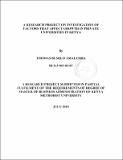A Research Project on Investigation of Factors That Affect Growth in Private Universities in Kenya

View/
Date
2010-07Author
Amalemba, Thomas Busolo
Type
ThesisLanguage
enMetadata
Show full item recordAbstract
The establishment of Private Universities in Kenya can be traced to Christian Missionaries who were at the forefront in the development of Christian Missionary work and spread of western education. Private Institutions of higher learning which existed before independence namely, St Paul's Theological College and Scotts Theological College became pioneer Private Universities in Kenya after the government, liberalization of education in the 1990s'. Currently there are more than twenty (20) private universities operating in Kenya under grant of authority from the Commission of Higher Education CHE. The private Universities have come to play a critical role of increasing accessibility of University Education to the increasing number of Kenyans who qualify but are unable to secure admission because of limited vacancies. For their bid to fulfill the role of providing higher education for all, Private Universities are faced with numerous constraints that hither limit their capacity growth. In this respect, the questions are as to whether Private universities have transformed the traditional academic programs offered, changed policies on recruitment of human resource, recruitment, modernized students' admission procedures systems, and product/service delivery methods, facilities and infrastructure necessary to promote and sustain growth. A critical look at the many studies in Private Universities in Kenya reveals that none of these concerned itself to the constraints facing Private Universities in Kenya and how they may be affecting growth. This study will add to the existing literature in this area by investigating the factors constraining growth in Private Universities in Kenya. It is being undertaken at a time when Private universities in Kenya are not able to cope with the demand for University education, and Kenya like other economies, appreciate the need to invest in University Education for its growing population to cope with the competitive global environment. The study is aimed at investigating the factors constraining the growth of Private Universities in Kenya namely: - resources, information technology, human resources, and products and services in order to recommend ways of overcoming them to facilitate growth. Data collection procedures used in this study involved: the seeking of authority from the respondent Universities to conduct research by way of an introductory cover letter to the academic administration division through the Vice Chancellors Office. Granted the permission, the researcher sought the help of the Universities to conduct the survey, to create rapport with the respondents. Survey questionnaires were personally administered to the sample of 21 Private Universities administration. This took 2 weeks and those completed, were personally picked. The study established that Private Universities studied are largely constrained by lack of adequate facilities, inadequate ICT resources, human resources capacity, in appropriate and insufficient products and services, which constrain the growth of Private Universities in Kenya. This results in limited Universities enrolment, in ability to offer necessary and relevant programmes and failure to achieve their objectives. The study concludes that the Private Universities in Kenya studied are largely constrained by inadequate availability of the factors that support and sustain growth. The study recommends that Private Universities in Kenya must leverage on the scarce resources by being innovative in delivery modes, recruitment policies, enrollment and registration of students to include open and long distance learning ( odlm), E-Learning in humanities and social sciences. Private Universities should enhance research and private enterprise to generate the needed funds both from Private bodies and governments. Embrace use of ICT, change recruitment policy to depart from faith based to professional competence, re-engineer programmes to offer more relevant government policy aligned programmes, establish linkages with other Universities local and International and establish networks for strong partnerships, exchange programmes to support research. Seek more government support to Private Universities in development capital and students' scholarships and tuition loans.
Publisher
KeMU
